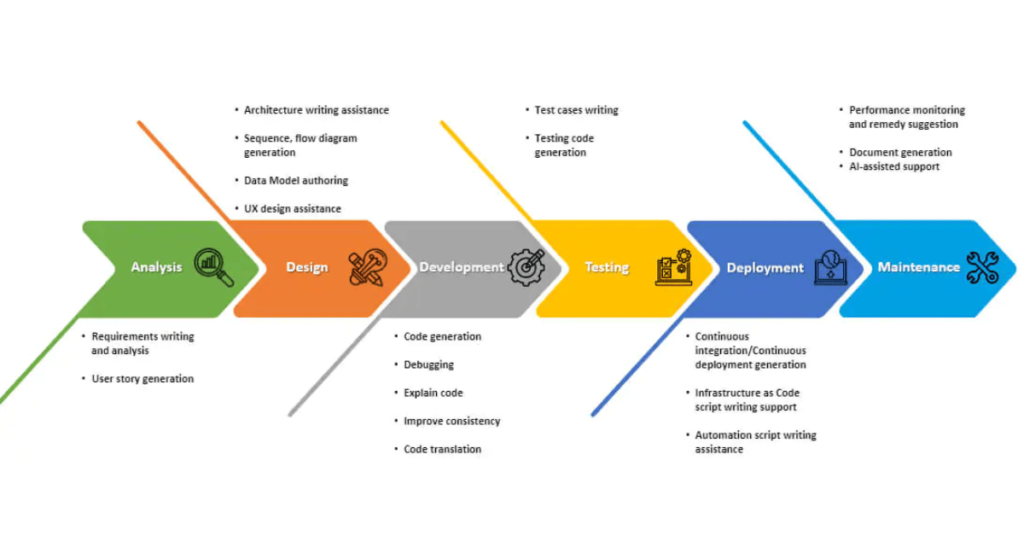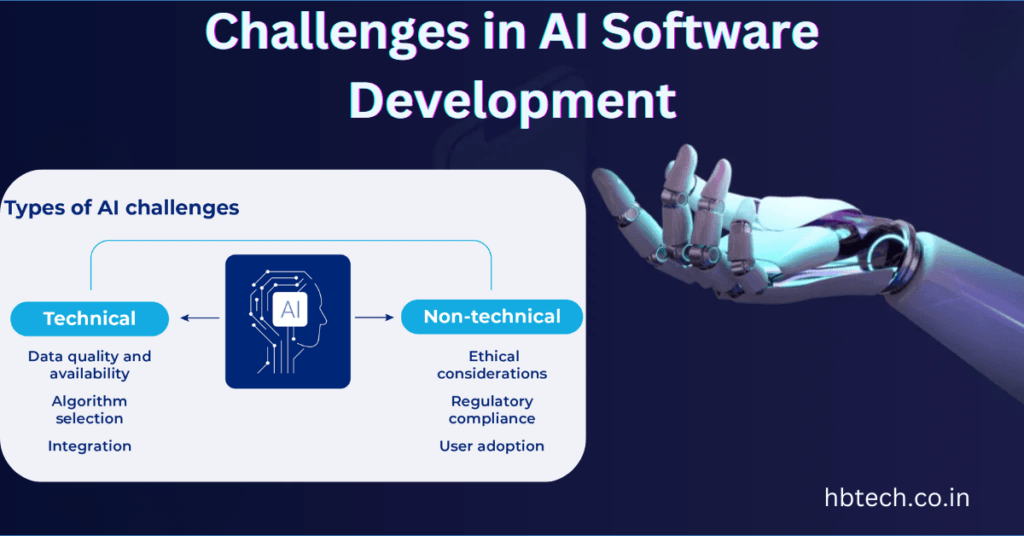Artificial Intelligence (AI) is revolutionizing industries like healthcare, finance and more. However, creating AI software isn’t as easy as it seems. While AI has immense potential, there are several hurdles to overcome during development and implementation.
AI Software Development Lifecycle
The AI lifecycle includes steps like identifying the problem, gathering data, building models and deploying them. AI software development is a key part of this process, turning theoretical AI concepts into real-world solutions.

The main stages of AI software development are :
- Defining the Problem : Understanding what needs to be solved and aligning it with business goals.
- Preparing Data : Collecting, cleaning and labeling data—a task that can be both time-consuming and prone to errors.
- Building Models : Creating algorithms to address the problem.
- Testing and Validating : Ensuring the model performs well and is free of bias.
- Deploying and Monitoring : Adding the AI system to existing infrastructure and keeping track of its performance over time.
Challenges can arise at each of these stages, making the development process complex and unpredictable.
AI Software Development Process
Developing AI software involves a team effort, with data scientists, engineers and business experts working together. The process typically includes:
- Iterative Prototyping : AI models need to be tested and improved multiple times before they are finalized.
- Scalability : Making sure the AI system can handle growing amounts of data and user activity.
- Integration : Combining AI with existing systems seamlessly.
- Ethics and Responsibility : Addressing issues like fairness, transparency and bias.
Despite advances in tools and techniques, AI development often brings unexpected challenges.
Challenges in AI Implementation
Building an AI solution involves more than just coding. Developers face several technical, operational and ethical challenges, such as :
- Data Issues:
- Poor-quality or insufficient data.
- Privacy concerns when dealing with sensitive information.
- Complex Algorithms:
- Balancing model accuracy with simplicity and interpretability.
- Selecting the right algorithm for each specific task.
- High Costs:
- Expensive hardware like GPUs and cloud computing.
- Energy consumption for training large models.
- Skill Shortage:
- A limited number of experts with the necessary skills in AI.
- Learning curves for new AI tools and frameworks.
- Ethical and Legal Issues:
- Preventing bias in decision-making.
- Adhering to legal regulations in different regions.
General Challenges in AI
AI also faces broader issues that impact society as a whole, such as :
- Trust and Transparency:
- Many AI systems act as “black boxes,” making it hard to understand how decisions are made.
- Bias in Models:
- If not carefully designed, AI can amplify existing biases in data.
- Resistance to Change:
- Organizations may hesitate to adopt AI due to fears about job loss or misunderstanding its value.
- Sustainability Concerns:
- Large-scale AI training requires significant energy, raising environmental concerns.
Challenges of AI in India
As a growing technology hub, India faces unique challenges in AI development and adoption :
- Infrastructure Gaps:
- Limited access to high-quality computational resources, especially in rural areas.
- Data Scarcity:
- Many sectors, such as agriculture and healthcare, lack sufficient digitized data.
- Skill Gaps:
- Not enough trained AI professionals despite a tech-savvy workforce.
- Regulatory Challenges:
- Lack of clear policies on AI ethics, data privacy and governance.
- Affordability Issues:
- Small and medium-sized businesses struggle with the costs of adopting AI solutions.
AI software development is both exciting and challenging. From preparing data to ensuring ethical use, developers must tackle various obstacles to create effective AI systems. In India, improving infrastructure, training professionals and clarifying regulations will be crucial for unlocking AI’s potential.
While these challenges may seem daunting, they also offer opportunities for innovation and growth. By addressing them strategically, we can create AI systems that are not only powerful but also ethical and sustainable.
Frequently Asked Questions(FAQs)
What are the main stages of AI software development?
AI software development involves several stages, including defining the problem, preparing data, building models, testing and validating and deploying and monitoring the AI system. Each stage requires careful planning to ensure successful outcomes.
What are the key challenges in implementing AI solutions?
Some major challenges include poor-quality or insufficient data, the complexity of algorithms, high computational costs, a shortage of skilled professionals and ethical and legal issues like bias and regulatory compliance.
What broader societal challenges does AI face?
AI faces challenges such as a lack of trust and transparency (black-box systems), bias in models, resistance to adoption due to fears of job loss and sustainability concerns related to energy-intensive model training.
What specific challenges does India face in AI development?
In India, challenges include infrastructure gaps, limited access to digitized data, a shortage of skilled AI professionals, unclear regulatory frameworks and high costs, particularly for small and medium-sized businesses.
Related Posts
- How to do Paytm Full KYC || From your mobile at home
- What’s app Privacy Policy : What’s App got angry || See what What’s App said…
- WhatsApp Banking : How to Check Bank Balance Through WhatsApp
- How Many SIM Cards are Activate with my Aadhar
- Exploring the World of ChatGPT: A Comprehensive Guide
- Canva: Your One-Stop Shop for All Things Design









